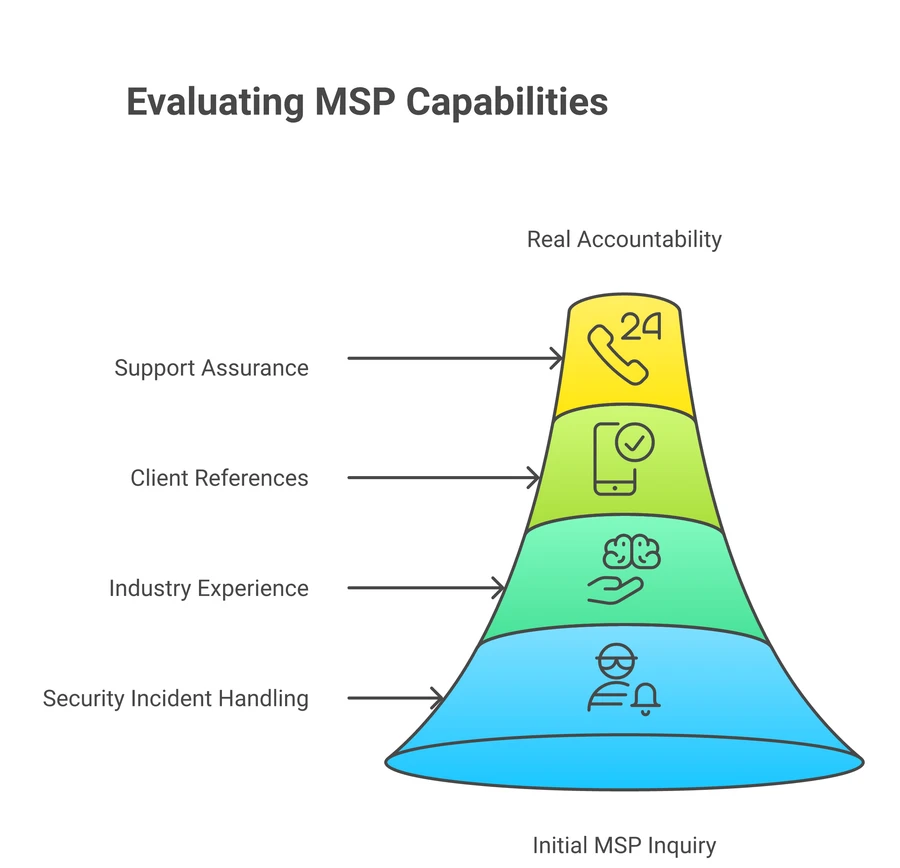
Selecting a managed services provider is a pivotal business decision, one where urgency and precision matter more than ever.
Small and medium-sized businesses can achieve up to 45% cost savings by opting for managed services instead of maintaining a traditional in-house IT team.
The right partner can help you anticipate risks and scale with confidence, but the wrong choice leaves you exposed and reactive.
In this blog, you’ll learn how to choose a managed services provider that aligns with your business goals, strengthens your security posture, and scales with your growth.
We’ll break down the key criteria most businesses overlook, so you can make a confident, informed decision that delivers long-term value.
Don’t Buy the Pitch. Demand the Proof!
4 Factors to Prioritize When Selecting a Managed Services Provider
When you select a managed services provider, you weigh much more than just cost; you are evaluating the backbone of your digital operations. Four factors should guide your decision of who to partner with to get the most value:
- Industry Experience: Providers with sector-specific expertise understand both regulatory hurdles and operational realities. This insight means you spend less time explaining and more time executing, as your MSP anticipates what’s next.
- Comprehensive Services: A partner who offers a full spectrum of managed IT, from cloud to cybersecurity, ensures you scale seamlessly, rather than juggling multiple vendors as you grow.
- Security and Compliance: With cyber incidents topping the list of MSP investments, a provider’s security posture should be uncompromising, including proactive defense and compliance alignment.
- 24/7/365 Availability: True business resilience demands genuine around-the-clock support. A green flag is a provider that delivers not just remote helpdesk responses, but also on-site IT and cybersecurity assistance, any hour, any day.
These critical drivers reveal whether an MSP is a transactional vendor or a strategic ally prepared to evolve alongside your business.
Real-World Snapshot: Understanding MSP Selection Criteria
As you navigate the crowded MSP arena, you will likely get confused. Every provider claims to be the answer, but you need more than glossy brochures and sales pitches. What truly matters is how a managed services provider aligns with your specific business drivers, not just how they talk tech.
You’ll want to zero in on what delivers measurable value. That means asking pointed questions about scalability, the depth of their security protocols, and, most importantly, their track records with real-world client outcomes.
| In 2025, managed services are estimated to generate $441.1 billion worldwide. The MSP market is evolving fast. Clients now expect a strategic partnership! |
Most businesses today outsource at least one critical IT function, so a provider’s breadth of capability is a necessity. When you focus your evaluation here, you stop chasing sales scripts and start building the foundation for a partnership that grows with you.
Managed Services Vendor Criteria for Choosing the Right MSP
Choosing the right managed services provider is a strategic decision with far-reaching consequences.
You should insist on:
- Proven Track Record: Look out for MSPs known for reliability and client satisfaction. Testimonials and referrals are your first line of defense against future headaches.
- Security Focus: Prioritize MSPs with strong, proactive cybersecurity and compliance, including clear policies and certifications such as ISO 27001.
- Scalability: Your provider should enable seamless growth, not just patch issues-think of them as architects, not just mechanics.
- Transparent Pricing: Demand clear, predictable pricing structures to ensure you’re never blindsided by hidden fees.
- Compliance Expertise: In regulated sectors, deep industry experience and certifications are non-negotiable to avoid compliance missteps.
Providers like AlphaKOR, with satisfaction guarantees and no locked-in contracts, illustrate what client-first transparency should look like. Choose an MSP that transforms IT from a burden into a true business advantage.
Questions to Ask an IT MSP: Focus on Specific Operational Realities

When evaluating a managed services provider, the questions you ask should cut straight to operational reality. Don’t get caught up in glossy sales promises.
- How do you handle security incidents? You want a playbook, not improvisation. Expect them to walk you through step-by-step protocols, name their incident response team, and reference tangible examples of threat containment and recovery.
- What is your experience in our industry? Listen for fluency in your industry’s regulatory demands and operational nuances. A generic answer signals a generic approach.
- Can you provide references from similar clients? Serious MSPs can connect you with clients who will vouch for their impact and reliability.
- How do you ensure 24/7/365 support? Demand specifics-dedicated on-call engineers, defined escalation procedures, and documented Service Level Agreements (SLAs) that make support performance measurable.
Press for precise answers. That way, you expose not just capability, but the mindset of accountability.
The Critical Questions That Distinguish a High-Performing MSP
You’ve done your homework and narrowed the field, but now is when authentic partnership comes into focus. Every Managed Services Provider (MSP) can pitch reliability.
However, only a few can demonstrate it under real scrutiny. This is your moment to ask the questions that separate the ordinary from the exceptional.
- How do you mitigate emerging security threats? Listen for specifics. Their response should reference proactive monitoring, layered defenses, and rapid response protocols.
- What does partnership look like to you beyond the contract? True MSPs don’t just fix-they anticipate. Seek evidence of ongoing guidance, not just break-fix support.
- How do you drive innovation for your clients? An elite MSP should point to concrete examples where they’ve introduced automation, AI, or new efficiencies that had a measurable business impact.
- How do you support growth and scaling? Understand their flexibility. Can they handle a sudden spike in users or new locations without losing service quality?
- What does your escalation path look like in critical situations? Clarity here means fewer surprises when the stakes are high.
Questions to Ask During MSP Discovery to Uncover True Operational Readiness
A structured discovery process is your best defense against future surprises. When evaluating a managed services provider, these direct questions help you see past the glossy pitch and into the operational core:
- What is your onboarding process? A mature, documented process minimizes risk. AlphaKOR, for example, often completes onboarding within the first month, signaling operational discipline.
- How do you measure and report on performance? Request regular IT and cyber security reports, with clear Active Threat monitoring. You want transparency, not vague reassurances.
- What is your approach to compliance? Seeking proactive compliance practices, up-to-date industry certifications, and the ability to support regulatory audits are non-negotiable for risk mitigation.
- How do you handle scaling as our needs change? Flexibility is essential. The right MSP demonstrates adaptability, offers tailored service packages, and doesn’t hesitate to structure flexible contracts when your business shifts.
| More articles you might like: |
Technical Questions That Qualify an MSP and Should Never Be Overlooked
When vetting a managed services provider, skipping the hard questions is a risk you can’t afford.
To truly qualify an MSP, insist on clear, technical answers to these non-negotiables:
- How do you secure client data against emerging threats? Look for layered security, proactive monitoring, SIEM, endpoint detection, and timely, automated patch management-not vague assurances.
- What certifications do your staff hold? The answer should reference respected industry standards and ongoing upskilling. Don’t get carried away by one-time badges. There must be a culture of continuous learning.
- How do you ensure business continuity during outages? You want to hear specifics on backup, disaster recovery, and real failover planning. Hope is not a strategy.
- What is your process for patch management? Expect a robust, auditable, and automated process for keeping systems secure and compliant.
These technical questions are your first line of defense against avoidable downtime and costly breaches. Challenge your prospective provider to answer with substance!
How to Choose Managed Security Services For Confident Security
Cybersecurity worries 60% of small businesses, yet just 23% are confident in their ability to respond. When your business faces advanced cyber threats, your choice of managed security services determines your resilience-or your fallout.
To make the right choice:
- Prioritize Security Expertise: Focus on providers trained in current threat intelligence who deliver advanced protections such as managed EDR, SIEM, threat hunting, and MFA.
- Demand Transparency: Expect detailed, real-time reporting on incidents and ongoing threat monitoring.
- Evaluate Compliance Readiness: Choose teams with proven regulatory compliance experience and custom incident response planning.
- Assess Incident Response: Ask for real-world breach response examples and verify that their plans are tailored, not templated.
What sets a partner apart? Active threat hunting, vertical-specific security certifications, and a true 24/7 SOC. Treat these as the standard.
A Simple MSP Checklist to Evaluate Your Options
Relying on gut instinct or sticker price alone exposes your organization to unseen risks. This comparison table provides you with greater clarity to select the perfect IT partner.
| Evaluation Dimension | What to Look For |
| 24/7/365 Availability | Uninterrupted support |
| Compliance and Security | Industry certifications, SOC 2, ISO 27001; comprehensive reporting |
| Flexibility and Scalability | Flexible packages, tailored onboarding, 30-day contract exit option |
| Service Level Guarantees | SLAs for response and resolution; transparent reporting |
You deserve more than vague assurances. Demand tangible proof across these dimensions. This approach exposes hollow marketing, ensuring your choice of managed services provider is grounded in facts, not wishful thinking.
Experience Strategic Technology Partnership with AlphaKOR
Selecting a managed services provider is ultimately about empowering your business with the right technology partner; one that’s agile, transparent, and deeply invested in your success.
With AlphaKOR Group, you access:
- 24/7/365 support: On-site and remote hybrid service ensures issues are resolved before they escalate.
- No long-term lock-ins: Flexible 30-day exit options keep you in control.
- Proven, long-standing expertise: Supporting businesses locally and nationally since 1995.
- Comprehensive cybersecurity built in: ISO 27001 policies, managed SOC, endpoint protection, and rapid incident response are standard.
- Transparent, client-focused agreements: Clear SLAs and satisfaction commitments foster real trust.
Trusted Managed IT Services Near You
| London, ON | Mississauga, ON | Windsor, ON |
If you’re seeking a managed services provider that delivers more than the basics, book a consultation with us today and discover what’s possible when IT and business strategy truly align.


